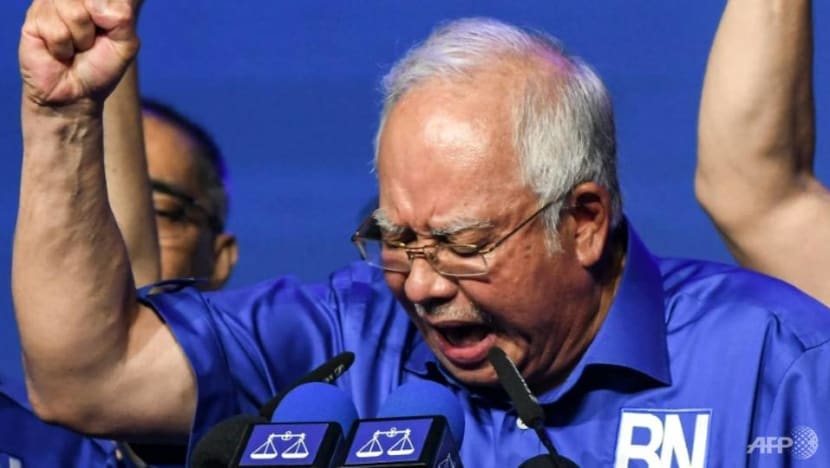commentary Commentary
Commentary: Incumbency has advantage but nothing taken for granted in Malaysia's general elections
Events leading up to Malaysia's general elections could not be more unpredictable, says one observer from the ISEAS-Yusof Ishak Institute who explains why.

Najib is tipped to win, despite a rising disillusionment with scandals, increased living costs and divisive racial politics in the multi-ethnic country. (Photo: AFP/Mohd RASFAN)
SINGAPORE: Prime Minister Najib Razak dissolved parliament on Saturday (Apr 7), paving the way for Malaysia’s 14th general elections.
State governments will follow suit in the days ahead, except for Sarawak which held its elections in 2016.
Elections will fall on May 9, with nomination day on Apr 28, the Election Commission announced on Tuesday (Apr 10).
ANTICIPATED TACTICS
Najib’s move was anticipated. Aggressive electoral redelineation and anti-fake news legislation had been passed in the parliament sitting that adjourned on Thursday (Apr 5) as well as a “provisional dissolution” of Parti Pribumi Bersatu Malaysia (PPBM) by the Registrar of Societies.
This move against the new opposition party, helmed by the Pakatan Harapan’s prime minister candidate Mahathir Mohamad, adds to the array of tactics utilised by the incumbent Barisan Nasional (BN) coalition.
A decade ago, heading into Malaysia’s 12th general elections, the outcome was largely taken for granted. Few predicted momentous change; the opposition was not fully united and BN would retain its two-thirds majority.
To a confounded public and pundits, BN’s seemingly impregnable two-thirds border was breached.
Almost exactly five years ago, Pakatan Rakyat forged an alliance for the 13th general elections and people rallied around magnetic leader Anwar Ibrahim.
Expectation of change punctuated campaigns, especially in urban areas which Pakatan overwhelmingly won. But despite securing 51 per cent of the popular vote, above the BN’s 47 per cent, Pakatan could not claim the keys to parliament.
BN fared worse than in 2008 but held on to the majority of seats, due to inordinate rural bias in the system, and on the back of support from the Malay electorate, as well as Sarawak and Sabah which remained securely in its fold.
UNPREDICTABLE DEVELOPMENTS
Events leading up to this 14th general elections could not be more unpredictable. Najib, beleaguered by gargantuan corruption scandals, has not only survived, but has strengthened his grip on UMNO and the coalition it dominates.
The macroeconomic report is robust, but the ground is restive. Economic growth has apparently not translated into commensurate improvements in living standards.
READ: A commentary on Johor residents' worries in the lead-up to Malaysia's general election.
SOLIDIFIED OPPOSITION
Two Malay-based splinter parties have emerged in recent years, vying for Malay majority constituencies, and taking the fight to the heartlands of UMNO and Islamist party PAS, which has staked out a “third force” position.
One year ago, the opposition lacked a common front, clear leader and joint platform.
Today, not only has Pakatan Harapan solidified their pact, they have settled on Mahathir as their best bet to win over Malay voters, negotiated seat allocations, projected a manifesto with unprecedented vigour, and even agreed to all component parties adopting PKR’s logo on the peninsula.
ADVANTAGES OF INCUMBENCY STILL STRONG
The advantages of incumbency remain strong. BN can count on its grassroots presence, party and civil service loyalty, along with its delivered and promised social assistance and infrastructure projects.
The general view is that BN, invigorated by its grandest ever manifesto, will hold power, but since 2008, nothing is taken for granted anymore.
Will these factors suffice to override the unpopularity of the prime minister and antipathy toward an out-of-touch political establishment, enough to allay economic anxiety and discontent?
Can Pakatan be credible and appealing enough to reach a tipping point? How will the presence of PAS split the Malay vote?
Will GE14 see BN’s popularity erode, or its fortunes swing back?
Personalities, pledges, policies and passions will flood Malaysia in the coming weeks.
The plot has been intriguingly scripted; the climax will be phenomenally suspenseful.
Lee Hwok-Aun is senior fellow at the ISEAS–Yusof Ishak Institute. This commentary first appeared in ISEAS Commentaries.
Read other commentaries on Malaysia’s impending general election:
1. The royal family's influence over how Johor will vote.
2. The younger array of leaders presented by the opposition.
3. Why Mahathir's leadership of the opposition confuses Kedah voters.
4. The unpredictability in swing state Johor.
5. Why Mahathir’s prime minister candidacy moves the opposition one step closer to toppling the Barisan Nasional.
6. Why UMNO and PAS have become complicit partners.
7. Why the Malaysia general election is an uphill battle for the opposition.














